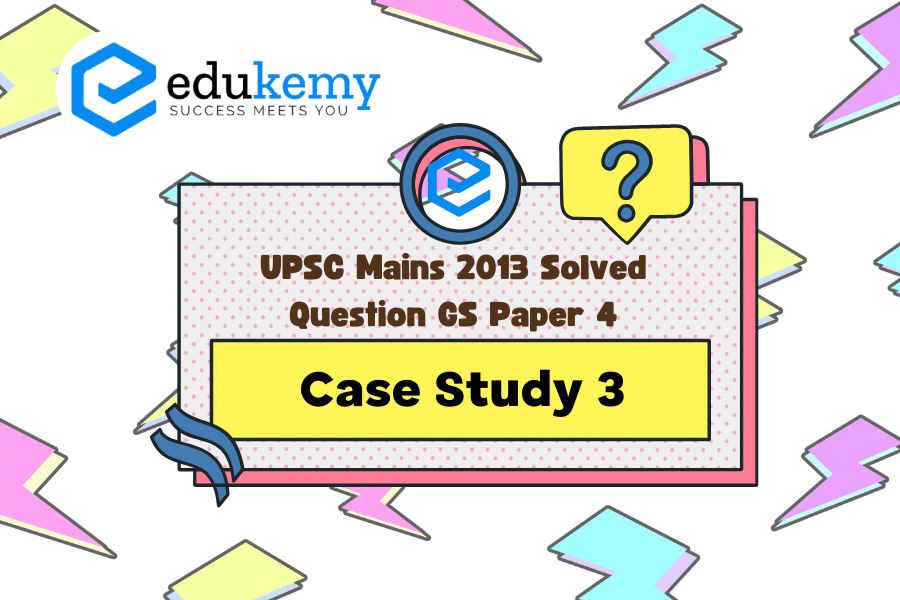The UPSC (Union Public Service Commission) examination is renowned as one of the most prestigious and challenging competitive exams in India. In the year 2013, the General Studies Paper 4, often referred to as GS 4, presented candidates with a diverse array of ethical dilemmas and situational questions. This paper aimed to evaluate the ethical and moral aptitude of aspiring civil servants, testing their ability to navigate complex issues with integrity and sound judgment. Through a series of case studies and theoretical inquiries, candidates were required to demonstrate their understanding of ethical principles and their practical application in governance and public administration. The UPSC GS 4 paper serves as a crucial benchmark for selecting individuals who possess not only the knowledge but also the ethical fortitude necessary to serve the nation with honesty, fairness, and dedication.
Q11. Sivakasi in Tamil Nadu is known for its manufacturing clusters on the firecrackers and matches. The local economy of the area is largely dependent on firecrackers industry. It has led to tangible economic development and improved standard of living in the area.
So far as child labour norms for hazardous industries like firecrackers industry are concerned, International Labour Organization (ILO) has set the minimum age as 18 years. In India, however, this age is 14 years.
The units in industrial clusters of firecrackers can be classified into registered and non-registered entities. One typical unit is household-based work. Though the law is clear on the use of child labour employment norms in registered/non-registered units, it does not include household-based works. Household-based work means children working under the supervision of their parents/relatives. To evade child labour norms, several units project themselves as household-based works but employ children from outside. Needless to say, employing children saves the costs for these units leading to higher profits to the owners.
On your visit to one of the units at Sivakasi, the owner takes you around the unit which has about 10-15 children below 14 years of age. The owner tells you that in his household-based unit, the children are all his relatives. You notice that several children smirk, when the owner tells you this. On deeper enquiry, you figure out that neither the owner nor the children are able to satisfactorily establish their relationship with each other.
(a) Bring out and discuss the ethical issues involved in the above case.
(b) What would be your reaction after your above visit? (300 Words, 25 Marks)
Tags: Case Studies
Case Summary: Sivakasi in Tamil Nadu is known for its manufacturing clusters on firecrackers and matches. One typical unit is household-based work. Household-based work means children working under the supervision of their parents/relatives. To evade child labour norms, several units project themselves as household-based works but employ children from outside. On a visit to one of the units you see that unit has about 10-15 children below 14 years of age. On deeper enquiry, you find out that neither the owner nor the children are able to satisfactorily establish their relationship with each other.
Stakeholders: children, households, owners.
Ethical Issues/Ethical Dilemmas: child labour, poverty, multi-stakeholders.
Contents
Answers:
Child labour deprives children of their right to education and enjoyment of childhood. Their growth is hampered due to such work. Child employment in India has still been rampant under one pretext or other. Employing children in small household based units manufacturing firecrackers is a legal escape. But it is unethical as subverting law is not permitted, though it would be difficult to hold them legally liable.
Another ethical issue involved in exposing and punishing these industries is that some children might be actually related to the manufacturer. Therefore, taking action against such units involves a delicate balance.
Poverty of children and their families is a heart-shaking issue. There should be more employment opportunities for parents which generates enough income to send the children to school.
(b) Steps to be taken:
If it is suspected that workers in a factory may be underage, the first priority will be to check their ID as part of a routine document check process without raising the alarm. If document checks confirm the child is underage or if ID checks are inconclusive, following actions to be taken:
- Remove the child from all work immediately. Preventing the continuation of work gives a clear message to factory managers. It also reduces the risk that managers may try to continue to use child workers under the guise of bogus ‘training centres’ or ‘apprenticeship schemes’.
- Ensure the child is in a safe place, Obtain contact details (ideally mobile phone number) of child and parents/guardian, and wherever possible, home address.
- Clarify the true identity and age of the child. Review age documents of the child and verify that they are genuine.
- Talk to the child to ensure they understand what is happening and why. Listen to them to understand their needs. Explain the possible remediation options and other measures to be put in place.
- It is vital to identify and establish a remediation team. This should be made up of representatives from the factory, the agent, the purchaser, local NGOs, trade unions (if active in the factory where child labour has been found) and local experts with the experience and capacity to work with children and their families to identify appropriate solutions.
- Strict actions against the owners will be ensured.
In case you still have your doubts, contact us on 9811333901.
For UPSC Prelims Resources, Click here
For Daily Updates and Study Material:
Join our Telegram Channel – Edukemy for IAS
- 1. Learn through Videos – here
- 2. Be Exam Ready by Practicing Daily MCQs – here
- 3. Daily Newsletter – Get all your Current Affairs Covered – here
- 4. Mains Answer Writing Practice – here


